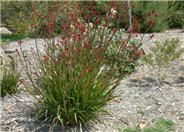
Common name:Kangaroo Paws, Red
Botanical name:Anigozanthos hybrids
This tender perennial is a clump-forming evergreen that produces fuzzy, yellow green flowers that bloom in spring and last for over 2 months. Many sizes and varieties are available including yellow and pink flowers.
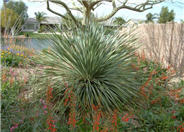
Common name:Spoon-Yucca
Botanical name:Dasylirion wheeleri
Spoon-Yucca requires little maintenance, as it tolerates drought, reflected heat and poor soils. It develops a short, thick trunk while reaching 6' tall and wide. Leaves are linear gray-green to 3' long and armed. During late spring and summer, erect stems of white creamy flowers are visible. It is a long lived shrub and slow-growing. It needs a well-drained site; it is cold and drought hardy.
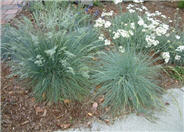
Common name:Blue Fescue
Botanical name:Festuca glauca
This ground cover/grass will grow less than 1' tall and has small, blue green leaves.
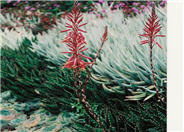
Common name:Gold Tooth Aloe
Botanical name:Aloe X nobilis
This succulent perennial will only grow 1' tall and 1' wide. It has large, sharp, dark green leaves and clusters of red-orange flowers that bloom in summer.
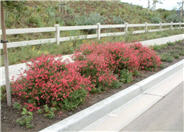
Common name:Red Star Autumn Sage
Botanical name:Salvia greggii 'Red Star'
This shrub will grow 1'-4' tall and 1'-4' wide. It has glossy green leaves with red flowers that bloom from fall to spring.
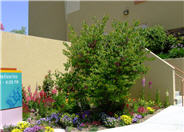
Common name:Western Redbud
Botanical name:Cercis occidentalis
This deciduous shrub ranges from 6'-20' tall and 10'-15' wide. It is desirable for its magenta spring flowers, yellow to red fall color, and dangling winter seed pods. It is tolerant of many soil types, drought and oak root fungus. It attracts hummingbirds and butterflies. The Western Redbud can be found statewide in CA in the foothills below 4500' elevations in chaparral and woodland communities.
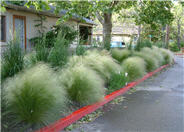
Common name:Mexican Feather Grass
Botanical name:Nassella tenuissima
This ornamental grass grows to 2' tall. It goes partially dormant during the summer but green in spring and fall. It prefers a sunny, well drained site. This plant can be invasive in some areas, so use caution. To keep reseeding to a minimum, drip irrigation will be best. Cut back in early spring to remove dormant foliage and dried seed heads. It can also tolerate dry shade. It grows to 10" wide and is the finest textured of the ornamental grasses.
| Designer: The Plant Nerd | Med Garden Side Yard |
Photographer: GardenSoft |
Soils and Compost:
Incorporate compost 6" into your soil to retain water, reduce compaction, feed earthworms, and provide valuable nutrients to your plants.
Water Saving Tip:
Check your irrigation system for breaks, leaks and problems once a month.
Integrated Pest Management:
Drip and other smart irrigation delivers water directly to roots, allowing no excess water for weeds.

